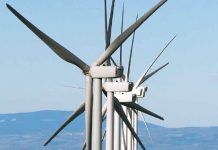According to a recent report by the American Wind Energy Association (AWEA), wind-generated energy saved consumers more than $1 billion in just two days during the polar vortex of January 2014. Demand for electricity and natural gas skyrocketed as much of the eastern United States needed energy to heat their homes and while the unusually freezing temperatures caused several conventional power plants to fail. The resulting higher prices for energy meant higher electricity bills and higher heating bills for those who used natural gas to stay warm. The Mid-Atlantic and Great Lakes states were hit especially hard during this cold snap and the resulting spikes in energy costs. Luckily, wind farms across the nation continued to produce a reliable source of energy when the demand for it was high and when other sources for that energy failed, thereby preventing power outages and softening the dramatic rise in the cost of electricity.
According to the report, wind energy’s consumer benefits stem from its fuel price stability. Wind is one of the few energy sources that offer perfect fuel price stability that can be locked in up-front because wind’s fuel cost will always be zero. For all other major conventional sources of electricity, fuel prices cannot be locked in for the long term and are often set by the spot market. The report also explains that wind energy creates large consumer benefits by displacing the most expensive, least efficient, and most volatilely priced power plants with a fixed-priced, zero-fuel cost, zero-emission energy source.
So, as the winter months grow more and more frigid, it can warm your heart to know that the turbines will keep turning, providing much of the country with the electricity it will need to make it to spring.
This month, we explored the operations side of O&M as well as the role obstruction lighting plays in the wind industry. Our inFocus section features a company profile on Vaisala, a leading provider of reliable environmental and industrial measurement equipment and services for a wide range of industries that has recently made a name for itself in wind. You’ll also find our conversation with Jim Mikel, the president of Renew Energy Maintenance, where we delve into the company’s role as a leading ISP in the wind market. Additionally, we feature an article by Dr. Zhiwei Zhang and Jesse Graeter of Romax Technology on the use of temporary measurement systems and the value they provide wind turbine owners and operators as well as an article by Jason Fohr of International Tower Lighting, LLC, on revised FAA guidelines for wind turbines and wind farms.
Columnists Jack Wallace and Jeff Walkup return this month to share their insights in their respective areas of expertise. The direction section also features a column by Gordon Moran from the European Energy Centre on what the U.S. wind industry can learn from Europe’s example.
As always, thanks for reading!


























